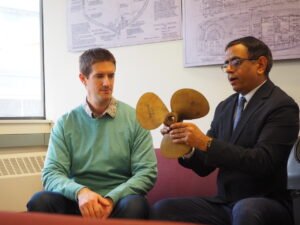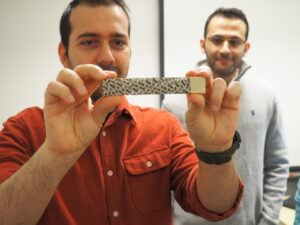January 22, 2023
The ocean can be a loud place to live.
In fact, marine mammals use sound to communicate, navigate, feed and detect danger.
But over the past several decades, an increasing number of human-caused sources have been filling the seas with sound. The increase in noise pollution can negatively impact foraging, communication, reproduction, and other behavioural aspects of marine mammals, especially whales, dolphins, and porpoises.

Seaspan-funded Industrial Research Chairs at the University of British Columbia are working on a new project that aims to turn down the loudness by studying solutions to reduce underwater ship noise.
The team is exploring newer, quieter, propeller and hull form technologies that would not only help the health of the animals, but also cut down on carbon emissions. The research is looking to develop an artificial intelligence (AI) framework to analyze the dynamics behind the noise and a suite of tools to help build quieter propellers and improve other ship parts and systems to dampen noise. They will also examine efficient AI-based predictions that can help alert ship operators to marine mammals so they can adjust their location.
Seaspan is proud to be helping to advance knowledge in areas critical to Canada’s environmental, innovation and shipbuilding priorities. That’s why we’ve recently invested $1 million over five years, under Canada’s National Shipbuilding Strategy, to fund a third Research Chair within UBC’s Faculty of Applied Science. The Chair, also supported with matching funding from UBC’s President’s Academic Excellence Initiative, will advance ground-breaking technologies and solutions and help educate new highly qualified graduates to support our marine sector. This investment is in addition to Seaspan’s 2016 announcement of $2 million over five years to support two Research Chairs at UBC.

Ultimately, the research supports Canada’s National Shipbuilding Strategy, as Seaspan is a long-term, strategic partner for building non-combat vessels for the Canadian Coast Guard and Royal Canadian Navy. This research supports our efforts to help rebuild Canada’s marine industry in a sustainable way, that can serve Canada for years to come.
The researchers are working closely with other industry partners, such as Robert Allan Limited and Vard Marine, in this five-year project, with funding support from Natural Sciences and Engineering Research Council of Canada (NSERC).
Together, we hope to create more efficient vessels and foster a vibrant marine industry, while improving the health of the global ocean soundscape for marine life and the people who depend on it.
Photo credit: Devan Power/UBC Faculty of Applied Science
